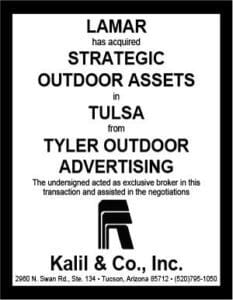
On April 23, 2024, the Federal Trade Commission issued an administrative rule banning non-competition clauses in employment. FTC Chair Lina Khan explained “noncompete clauses keep wages low, suppress new ideas, and rob the American economy of dynamism, including from the more than 8,500 new startups that would be created a year once non-competes are banned. The FTC’s final rule to ban non-competes will ensure Americans have the freedom to pursue a new job, start a new business, or bring a new idea to the market.”
As I originally explained in my March 10, 2022 article in Billboard Insider (“Rothfelder on Covenants not to Compete”), these non-compete clauses are regularly used in the out of home industry, both in connection with the sale of businesses and in employment. In fact, I got my original start in representing billboard companies over 40 years ago, when I represented former sales and real estate managers who left a local billboard company and started up a competing operator in the face of their non-competition agreements. Those former employees won their case, but their new company only lasted a couple of years, AND the former employer has since become one of my best and longest clients. In any event, these non-compete clauses in employment are designed to protect the business and good will of the employer by establishing reasonable restrictions on the geographic, temporal, and scope of the competitive employment. For example, by securing promises not to solicit billboard advertisers or lessors within a 50 mile or so radius for two or three years after termination of employment, the employer supposedly minimizes his vulnerability to former employees who unfairly utilize confidential customer, pricing, and leasing lists when undertaking new employment with a competitor.
But, this interest of the employer is balanced against the general ideals supporting freedom of contract and the right to work of the employee. So, most States have historically required that the employer demonstrate more than a mere breach of contract by the former employee to trigger monetary or injunctive relief. In Texas, for example, the Texas Free Enterprise and Antitrust Act requires the employer to prove the non-compete is enforceable and that it “contain limitations as to time, geographical area, and scope of activity to be restrained that are reasonable and do not impose a greater restraint than is reasonably necessary to protect the goodwill or other business interests of the [employer].”
Now, under the FTC’s new rule, almost all existing non-competition clauses, no matter how conservatively or reasonably drafted, will be rendered unenforceable across the Country. An exception exists for “senior executives,” i.e., those workers earning over $151,164 annually in a policy-making position, who will remain bound to the extent permitted by controlling State law. Otherwise, employers are prohibited from entering new or enforcing existing non-compete agreements when the rule becomes effective in 120 days.
The US Chamber of Commerce and other employer groups have vowed to file legal challenges to the FTC rule, calling it “an unlawful power grab” on an issue that should instead be left to the States. Two out of the five Commissioners on the FTC apparently agreed, as the vote on the rule narrowly passed by 3 to 2. Depending on the litigation, the implementation of the rule and the use of non-competes in the billboard and other industries may be delayed or modified. Thus, both employers and employees ought to use extreme caution and seek competent legal counsel in deciding how to proceed.
Billboard Insider’s note: We asked Rothfelder whether a non-compete clause is enforceable when it is part of an asset purchase and he said yes. The FTC ruling only applies to employment contracts, not to asset purchases.
To receive a free morning newsletter with each day’s Billboard insider articles email info@billboardinsider.com with the word “Subscribe” in the title. Our newsletter is free and we don’t sell our subscriber list.
Paid Advertisement

















